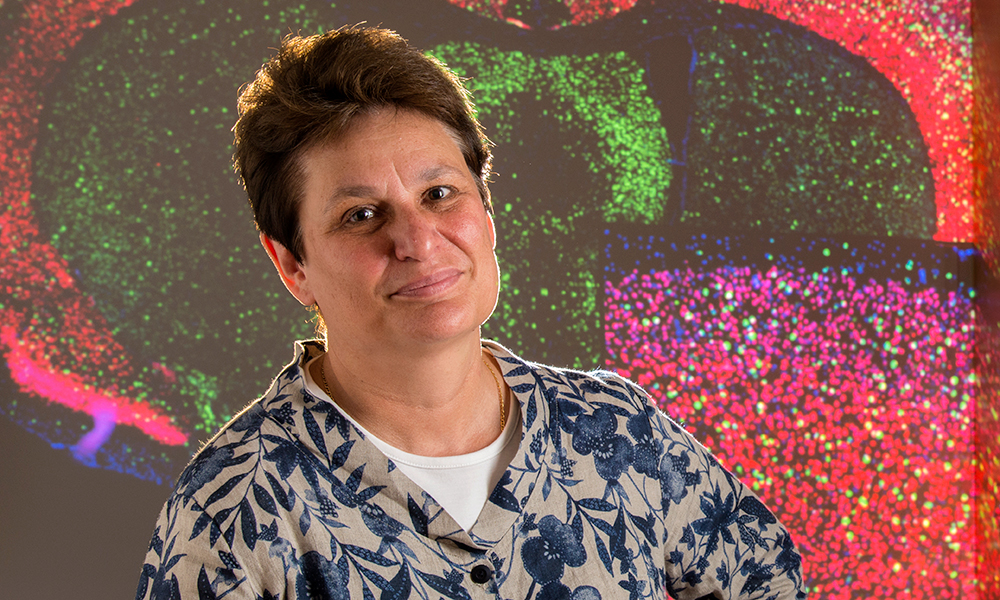Catherine Dulac, Higgins Professor of Molecular and Cellular Biology, has been awarded the 2017 Edward M. Scolnick Prize in Neuroscience. The Scolnick Prize, which consists of a $150,000 award plus an inscribed gift, is given annually by the McGovern Institute for Brain Research at MIT to recognize outstanding advances in any field of neuroscience. Dulac’s research has elucidated how pheromones control brain function and behavior, and characterized the neuronal circuits that underlie sex-specific behaviors. On March 13, she will be presented with the award and will deliver a lecture entitled “The Neurobiology of Social Behavior Circuits” at the McGovern Institute. “I never thought I would one day join the prestigious ranks of Scolnick Prize recipients, and I am honored to be able to represent Harvard’s contributions to the field of neuroscience,” Dulac says.
Dulac received her PhD from Pierre and Marie Curie University in Paris, where she studied mechanisms of neural crest development with Nicole le Douarin at the College de France. She moved to the US in 1992 for a postdoctoral fellowship in the laboratory of Richard Axel at Columbia University, then joined the MCB faculty in 1996, serving as Department Chair from 2007-2013. She is also an investigator of the Howard Hughes Medical Institute, a fellow of the American Academy of Arts and Sciences, a Chevalier de la Legion d’Honneur, a member of the French Academy of Sciences, and a member of the US National Academy of Sciences.
Dulac is best known for her discovery of the pheromone receptors and brain circuits that control sex-specific behaviors. Pheromones are chemicals released by animals that travel through the air and play a major role in many behaviors in mammals, including aggression and reproduction. Pheromones differ from odorants, airborne chemicals that cause the perception of smell, in that animals’ responses to pheromones are fixed and consistent, while responses to odors can be learned and change over time. In work that began during her postdoc, Dulac set out to identify the then-unknown pheromone receptors and the neuronal circuits that underlie pheromone-evoked responses. She developed novel methods for analyzing RNA from individual sensory neurons, leading to the discovery of a large family of pheromone receptor genes and demonstrating the feasibility of analyzing the transcriptomes of individual neurons, an approach that is now widely used to study the brain’s extraordinary complexity.
Soon after starting her own lab at Harvard, Dulac discovered a second family of pheromone receptor genes and went on to study the mechanism of pheromone action, identifying the ion channel TRPC2 as an essential player in the neuronal response to pheromone signaling. By genetically manipulating this signaling pathway in mice, Dulac found that information from these pheromone-receptive neurons are necessary for gender identification and the sex-specificity of social behaviors, including mating, aggression, and parenting. She was also able to trace the connections from those neurons to the brain systems that control these behaviors, and to characterize specific neuronal populations that are necessary and sufficient for specific social behaviors. One population of neurons in the hypothalamus, for example, induces parenting while reducing aggression in male mice, so that they do not attack their own offspring.
Dulac’s lab has also undertaken more recent research into genomic imprinting, studying the differences in gene expression depending on whether they were inherited from the mother or father. The group has found that genomic imprinting in the brain is much more common than was previously thought, and has implications for both basic biology and the epidemiology of brain disorders. “I am grateful to the McGovern Institute for recognizing the importance of these areas to our understanding of neuroscience as a discipline, and I look forward to my lab’s continuing investigations into the genetic underpinnings of gender-specific traits and behaviors,” says Dulac. “This recognition is highly deserved,” adds Alex Schier, Chair of the MCB department. “My colleagues and I are inspired by Catherine’s exceptional research, and value her tireless efforts and contributions to MCB and Harvard.”
Announcement by McGovern Institute for Brain Research at MIT
Announcement by Harvard Gazette
Catherine Dulac’s faculty profile
by Lindsay Brownell




